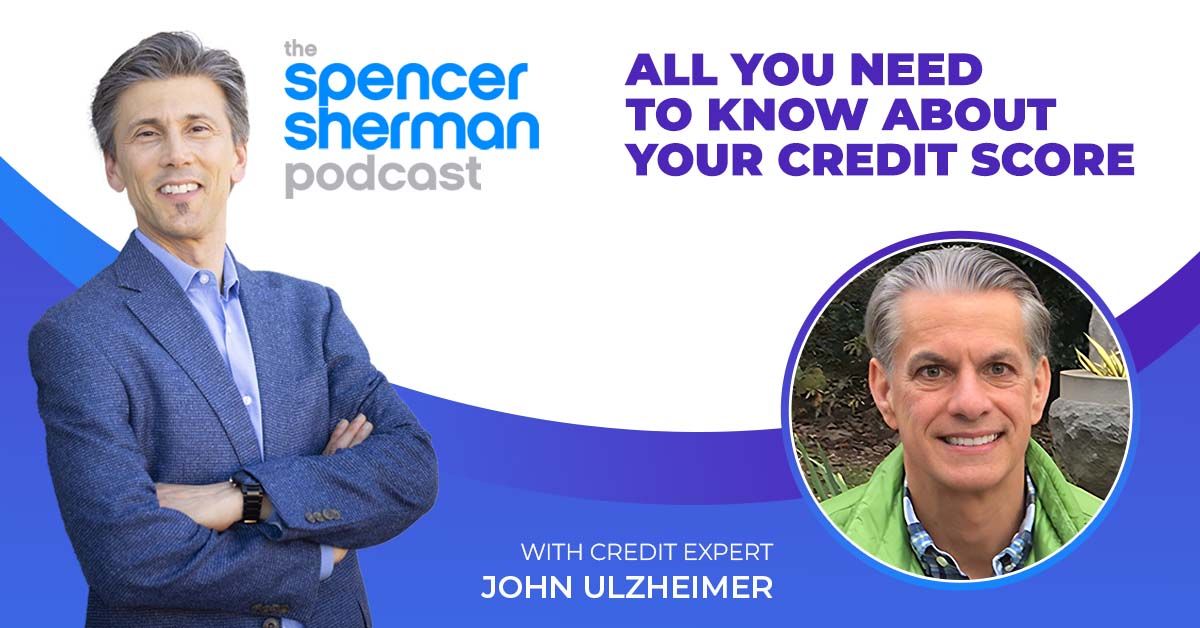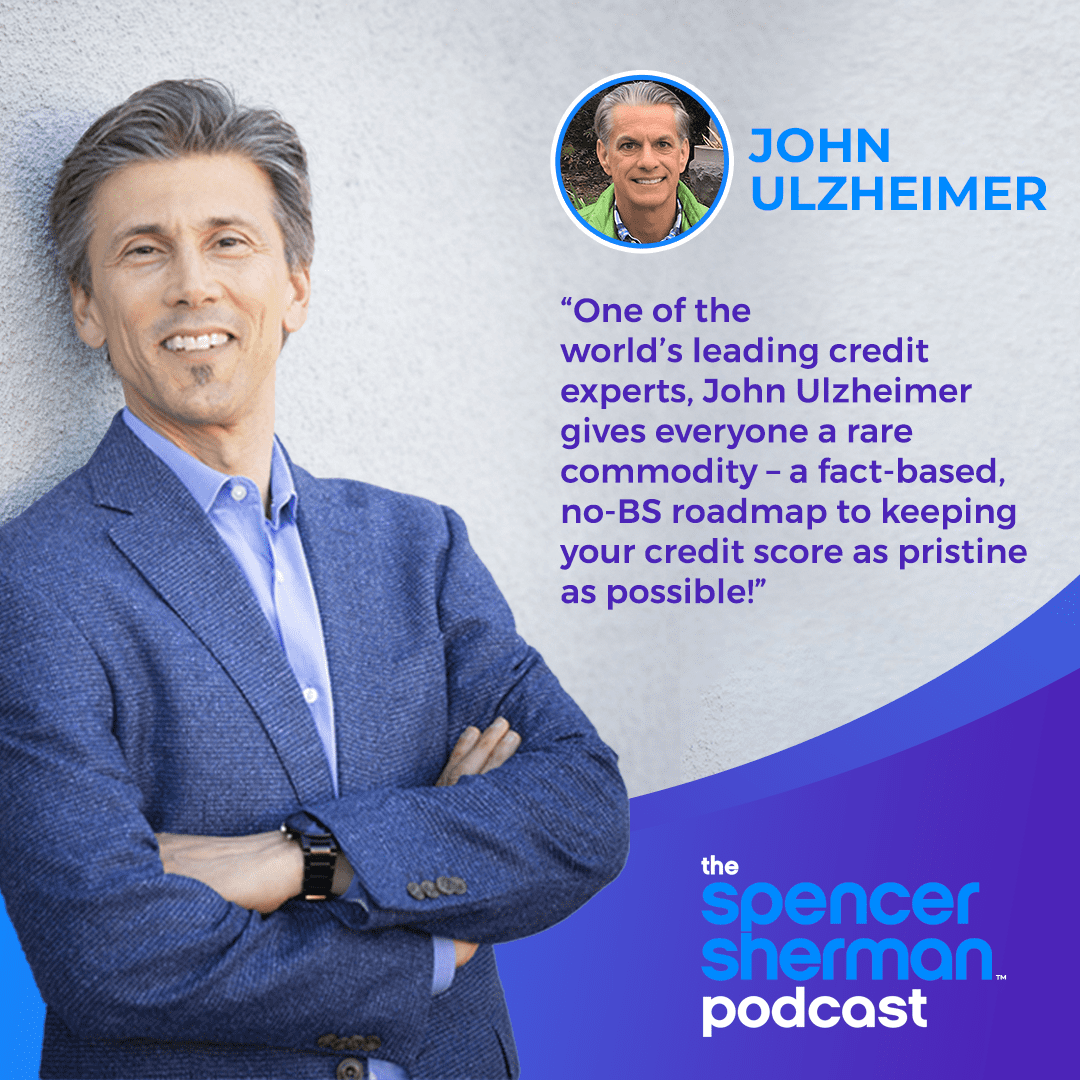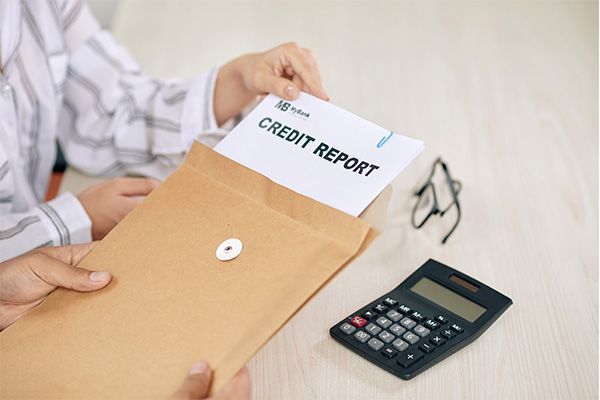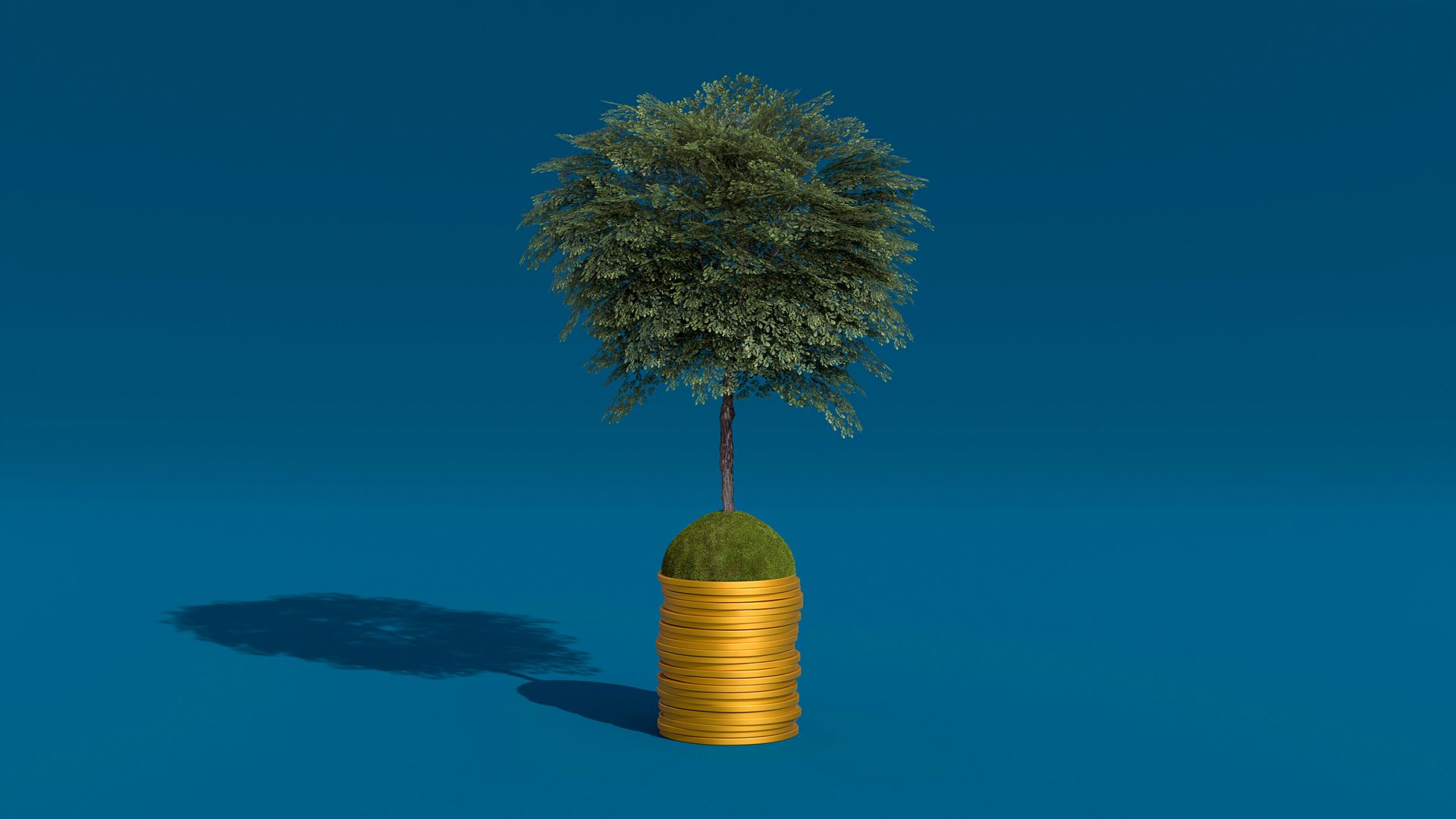
Credit is not interesting until you need it. But when the time comes when you really need it, it becomes the most important thing in your life! That is why it never hurts to take proactive steps to keep your credit score as pristine as possible. And, no, you don’t need to pay someone $139/month to help you improve your credit score. All you have to do is adopt a few healthy credit and financial habits and check your credit reports regularly using free resources. World-leading credit expert John Ulzheimer points us to the direction of these tips and resources. He joins Spencer Sherman on the show for this very reason. Tune in and learn how you can keep your credit score in the best condition in case you need it.
---
Listen to the podcast here
All You Need To Know About Your Credit Score With Credit Expert John Ulzheimer
We are training our brains for financial success. After many years of being a financial advisor, what I’ve discovered is that it’s our emotions, fear, and fixed beliefs about money that often override our common sense. All these shows are about helping us retrain the brain, and setting up healthier neural pathways so that we’re responding, not reacting to money in our lives. One of the overlooked areas around money is credit. It was even overlooked by me, I have to admit. A poor credit score can make home or car buying more expensive or even impossible. Too much debt can overwhelm our finances. Do you even know your credit score and how it affects you? How do you improve your credit score and how do you decrease those loan payments?
Maybe you’re feeling overwhelmed or embarrassed because you put too much money on a credit card at times or your credit score isn’t what you want it to be. You’re simply in the dark about how to check. In this episode, we’re going to take a deep dive into everything you need to know about credit. How to check the credit score? Simple steps to get the most out of your credit card debt and how to improve things. That will affect every aspect of your finances, including being less stressed around your finances, which was what we’re so focused on in this show. Lowering stress puts us into a much healthier mind state where we’re able to make much better, wiser financial decisions. I am so excited and you don’t want to miss this conversation.
We have with us one of the world’s leading credit experts. John Ulzheimer is here with us. John is the only recognized credit expert who comes from the credit industry. We are going to get the inside scoop. Open up your eyes and put everything else aside. I know that when it comes to money, it’s a very triggering topic and it’s even hard for us to pay attention. I want to invite you to let go of the emails and the surfing online and bring your attention here because this is something that can make a huge difference in your life. Even if it’s a topic that maybe is not the most titillating when you first start hearing the word credit score. Who wants to talk about credit scores? Here we are. John, I want to welcome you to the show.
Thank you so much for having me, Spencer. I appreciate it.
Credit scores, as I said, affect our wallets and our stress levels. I think that there’s so much to credit scores. I have to be honest with you. I have not dived into this topic much. I’ve always thought of credit scores as being not so interesting topic. I’m wondering how did you get into the credit industry? How did that become your life?

Credit is not interesting until you need it and then all of a sudden, it’s interesting. Especially if you can’t get it or if it’s expensive, then suddenly, it’s the most important thing in your life. I didn’t go to school. There is no college degree in credit. The way I got into it is I grew up in Atlanta and Equifax which is 1 of the 3 credit bureaus in the US and 1 of the 2 credit bureaus in Canada. Equifax was and still is headquartered in Atlanta. When I graduated from college in ‘91, that predated the internet as we know it now, which meant no job posting websites, none of that kind of stuff. I basically blanketed the Atlanta area with resumés the old-fashioned way using the US mail system.
The job market in Atlanta was horrible at that time. Believe it or not, I was fortunate enough to get an interview with some company I had never heard of called Equifax. I’d driven by the building a million times. I had no idea what they did. I did a little bit of research prior to my interview there and boning up on what a credit report is because that’s primarily what they did at that time. I went in for my interview. This is going to age me. I past a typing test, which was a requirement and that was me getting on the way to a career in credit. November of 2022 will be my 31st year in the industry.
I love that sometimes we wind up in things and I always share with my kids that you don’t know what’s going to happen. Life has a way of presenting us with opportunities that we have to keep our eyes and ears open, which is what we’re trying to do here. For some of us, we’ve ignored our credit card scores. Maybe it’s kept us from buying things that we wanted to buy and we didn’t bother doing much about it or we felt like we couldn’t do something about it.
I’ll admit for me, John, and many of my clients that I’ve worked with over the years that I haven’t made a lot of huge purchases in my life beyond what I could afford without needing much loans. Credit hasn’t been a big thing in my personal life. I’m wondering if we could start with what is a good credit score. We hear that term all the time from so many people. I spoke to a friend who has an MBA and asked him what he thought was a good credit score. He did not know, so tell us.
A good credit score and the range of credit scores is called scaling. It’s the scaling of a credit score. A commonly used credit scoring system in the US is 300 on the low end to 850 on the high end. A good credit score is any credit score that’s going to get you approved with the lender’s best terms. That’s a good credit score. The best-published interest rates on auto loans are for people who have scores of 720 and above. The best-published interest rate for people on mortgage loans is going to be 760 and above.
Credit cards don’t publish their minimum requirements like mortgage lenders and auto lenders tend to do. They tend to be a little bit more open with that information. There’s a credit card for everybody everywhere along that continuum of scores. For example, Amex. If you want an Amex card, you better have good credit. If someone with a low FICO score does not need to apply for an Amex because they’re not going to get approved.
On the flip side, Credit One Bank is a subprime card issuer and you would not expect someone with a FICO score of 820 to need to apply for a subprime credit card. There are all different credit cards that fall in between those two polar opposites. It’s 720 for auto, 760 for mortgage, and pretty much anything for credit cards.
Does that mean if you have an 800 score and somebody else has a 760 score, there’s not a big difference?
You have all these people that chase the 850 and obsess about the perfect credit score when it’s a waste of time and entirely unnecessary. The minute they hit that 760 and above range, you’re viewed as being equally void of credit risk. When I say get past 750, I don’t suggest people shoot for 750 because your scores migrate up and down organically. You’re going to go above it and you’re going to go below it. I always tell people to try to earn the highest credit score possible. If you happen to earn something in excess of 760, then you can start worrying about something else in your life because you can check the box of credit scores.

Maybe you can give us a sense. Does anybody have a perfect credit score of 850? What are the ingredients or the steps that lead to that? This was a question I was going to ask you later, but I can ask it now. If one is starting out in life in their twenties, what’s the path that would take you to 850? Does anybody have that score?
Believe it or not, a lot of people have 850s. This is maybe me becoming the interviewer. What do you think the average FICO score is? I’ve posed this question before and the answers are interesting to me because it gives an anecdotal perception of what people think about credit scores. The average, if you want to answer, I’d love to hear it.
I’m not going to look it up online, but I’m going to guess that it’s around 600.
That’s a fair guess. The average credit score in the US right now is 716. There’s no right or wrong answer. That’s a fair answer. 600 would be 116 points below the national average. What that indicates is that most people in this country have good credit. If you look at the percentage of consumers who have scores and say, the 760 and above range, it’s unbelievably high, well over 1/3. Your scores move, meaning that they’re not chiseled in stone. They’re almost a little bit like the mercury in an old-fashioned thermometer. One day, you look at it and it’s 75 degrees. The next day you look at it and it’s 86 degrees. You look at it the next day and it’s 84 degrees, but your credit scores are not likely to remain the same. They will be different over different points in time as the information on your credit reports changes.
If you’re looking for the anatomy of a good credit score, especially something like 850, that is perfection. It means you have to do everything perfectly. You can’t do some things right and do other things wrong. You have to nail it. That is why I always tell people, “Don’t obsess over 850 because A) You’re going to drive yourself crazy and B) You don’t need it.” The anatomy of a score that’s going to fall into that 800-plus range is going to be a credit report that is completely void of negative information, which means no late payments, no collections, you’ve never filed for bankruptcy, nothing on your credit report to indicate default, repo or foreclosure. Anything that you can assume means that you didn’t manage an obligation properly, that is going to prevent you from having these stellar credit scores.
Number two is credit card debt. You can have hundreds of thousands of dollars of installment debt and still have elite-level credit scores. You can’t say about credit card debt. Credit card debt defaults at a higher rate than installment debt. Therefore, it’s a riskier type of debt and it’s going to be more problematic for a credit score. You want to have as little credit card debt as possible, which is smart from a financial perspective, not just a credit perspective.
Have as little credit card debt as possible. That is a smart move from a financial perspective, not just a credit perspective.
Are you paying it off each month? Is that what you’re saying?
If you can.
Are you saying that it doesn’t matter what your credit card statement says each month as long as you pay it off, does that lead you to the perfect score?
Not necessarily. Just because you pay it off in full of your month, it doesn’t mean it’s going to show up as being paid off on a credit report. The credit card issuers only update your credit reports once a month and it’s based on your most recent statement. If you get a statement and that statement has a balance, then the balance is going to be what’s reported to the credit bureaus. You may pay that balance in full every single month and therefore, you don’t carry debt and revolve, but your credit report you’re never going to show a zero balance because you always have it.
Even if you’ve never paid any credit card interest, you could still be showing a balance that is going to hurt your credit card score.
There’s no doubt about that. That’s absolutely right.
Are you saying that it’s better to have no credit card at all?
No. I didn’t say that. Remember, you don’t need a perfect score to function effectively in the US credit system. You can use credit cards as much as you want. It’s not a good idea to carry the debt because credit card interest rates are likely going to be the most expensive interest rates you ever have unless you use payday loans or some other second-tier form of credit. When it comes time to borrow money to buy a house or a car, that’s when you need to get a little bit more strategic with your credit cards and your credit card debt.
You may need to put them on the shelf for one month, therefore, your statement is zero or pay them in full before the statement closing date. Even though you’ve used your credit card, the balance on your statement is zero because you’ve already paid it in advance of the statement being generated. There are some sneaky ways. I call that the credit score hack.
Pay it off in advance of the statement date and then don’t put more on the credit card.
That’s right. Remember, when the statement is cut, that’s the balance that’s sent to the credit bureaus. If you get a statement and the statement indicates that you owe $1,000, that is what’s going to show up on your credit report. If you pay that $1,000 a week before you get your statement, the balance on your credit report is going to be zero.
I want to reiterate what you’re saying. You fell into my next question here. It’s perfect. If you’re gearing up to do something like borrowing money for a house, a business, or a car, you want to start taking some steps and you’re giving us some of those steps which is to pay off the balance in advance of the statement date. Don’t put more credit card debt on there until you apply for the loan.
When you apply for a loan, it depends on the type of loan. With a credit card, you’re going to be approved almost instantaneously when you make your application because it’s all automated. For an auto loan, it may require shopping or a credit report around before you get approval. Obviously, with a mortgage loan, it’s a much longer process. You may be able to get pre-qualified immediately, but you’re going to have to go through the normal underwriting procedures before you get approved. It’s a good idea, especially if you are trying to get the best interest rate on something expensive. The difference in 100 basis points on a mortgage loan is very different than 100 basis points on a credit card or an auto loan.
You want to work to maximize the score and stay out of debt. When you finish closing and you get your keys at the closing table on a mortgage, then you can go do what you want. Up until then, you might want to stay out of debt for that period of time during underwriting. A lot of people don’t know this. The mortgage lenders will pull your credit reports at the beginning of the process. They’ll also pull your credit reports at the end of the process to make sure that you haven’t taken on any new debt while the underwriting was occurring. The mortgage lenders may hold that against you. Your mortgage broker will probably explain this to you when you apply and warn you, “Please stay out of debt during the next 4 to 6 weeks,” because they may change the deal terms.
Keep going on this track of what else can we do to brighten our credit scores. What I’m hearing so far is about no late payments paying off the credit card each month, especially in anticipation of a loan, paying it off by the statement date and not putting more money on the credit card. Is there a rule about how many credit cards you should have or not, like department store cards, regular credit cards, or Amex cards? What can we do there or anything else to improve our credit scores?
The style of the card is not material. It’s how you’re managing it that’s important. It doesn’t matter if you have an Amex, Cap One card, or a Chase. None of that matters. You’re not penalized or rewarded because you have those accounts. The first two things we talked about, payment history and debt, are things that people can largely control. You can choose not to get into debt. If you choose to stay out of excessive debt, then it’s not hard to make your payments on time.
There are other things that are out of your control. One of the components of credit scoring systems has to do with the age-related metrics of your credit report. Not the age of the consumer, but it’s the age of the credit report. Things like the age of your oldest account and the average age of your accounts. This is where somebody who’s very young, let’s say in their 20s or maybe even in their 30s, is not going to be able to earn the maximum number of points in those categories because they’re simply not old enough. That’s why someone in their 20s is not going to have 850s. That is impossible.
Most likely, if you’re in your 20s and you want to buy a house, you’ve got a factor in that it might cost you more than if you wait until you’re 30.
Remember, you only need 760 in order to get that.
You can get 760 even if you’re 24.
Yeah, easily, but you’re not going to get 850.
Don’t worry about getting your credit score to 850. There is no real big advantage to getting 850 over 760.
We don’t need 850.
Don’t worry about it when you’re in your early twenties.
There’s no real big advantage to getting 850 over 760.
There’s no small advantage. There’s no advantage at all.
This is one area of our lives where we don’t have to be perfectionists.
Other than bragging, there’s nothing better about an 850 than an 830 than an 820. I understand it. You’re ensuring yourself against maybe one month you incur a ton of credit card debt because you’re buying holiday presents or you’re going on vacation so you got a ton of debt one month and your credit score takes a hit because of it. However, because your credit score was 840 last month, the hit is immaterial. You’re almost ensuring off against problematic changes to your scores by earning those elite-level scores and not barely getting to the 760 points.
This is good because we’re in an environment where there’s a lot of home buying going on and that’s certainly one of the biggest things we borrow money for. Maybe you can also talk about borrowing money for a business loan or something. In terms of a mortgage, which is far more common, it sounds like I should be checking my credit score 6 months, 1 year, or 2 years. How much before I’m buying my house? Maybe it’s ASAP, check that credit score to see if I’m at that 760 level.
If any of your readers haven’t checked their credit scores or credit reports in the last 2 to 3 months, once they get done reading this, they need to go check their credit reports.
How do you do that? How do you check your credit?
The information is way too important to turn your back on it for any period of time. There are a variety of ways to check your credit reports. The Fair Credit Reporting Act gives everybody in this country the ability to check their credit reports for free. The website that the credit reporting agencies were required to set up in order to deliver these free disclosures of credit reports has been around for years now. It’s not a new website. It’s AnnualCreditReport.com. Make sure you spell that cause if you don’t spell it, you’re going to end up on some squatter website that’s going to try to sell you stuff.
That website is formally referred to as the central source and you’ll see branding from all the credit bureaus on that website. You’ll be able to go and request copies of your credit reports and then download them and check them out. The credit reporting industry, while they’re only required to give you 1 every 12 months, ever since COVID hit, they’ve unlocked that website and you can check your credit reports once a week, which no one does.
You won’t hurt your credit score when you check it.
I don’t know who in the world starts that, but I’ll tell you what, car dealerships and credit card issues love to suggest that can happen and lean on it in their marketing. No one from the industry ever suggested that checking your own credit report has any influence at all on your credit card. It’s almost like creating a problem and then solving the problem. That drives me crazy that companies do that. No, it’s not going to play the game and hurt your credit score if you check your credit report.
It's not going to hurt your credit score if you check your credit report.
Let’s say you’re at that average US score, which I think you said was around 715 or something, and you find that out. You’re thinking about buying this house and your credit score is at 715. What do you suggest that person does in the year before they’re going to buy this house to get up to the 760 from the 715?
They may or may not be able to achieve that is my point. There are some things that are actionable and there are some things that are not actionable. If you play your credit scores and you’re in the low 700s, I wouldn’t apply for a mortgage yet because if you do, you may get approved, but you’re not going to get the best interest rate. In six months or a year, you may want to refinance. That’s expensive. I would wait. The path to higher scores is different for everybody. There is no universal advice on how any one person can improve their scores and then expect that advice to be applicable to the over 200 million people who have credit reports in this country.
It’s not necessarily true that if you stop putting anything on your credit cards, that’s going to improve your credit score.
If you’re in $50,000 of credit card debt and you stop using your credit cards, your credit scores aren’t going to go up. You’re still in $50,000.
Let’s say you paid that $50,000 debt off. Is it better if you stop using your credit cards and use your debit cards or use cash?
If you’re able to write a big fat check and get yourself out of a massive amount of credit card debt, then it’s highly likely your credit scores are going to go up unless your credit reports are loaded with negative information. I know this isn’t the topic. I would never suggest somebody convert off of credit and start using debit and certainly not cash. Where I live, there are merchants who won’t even take cash any longer. I still like credit as the primary option. I like proper management of credit, not abusive use of credit cards. One of the actionable ways to improve a credit score is to pay down or pay off your credit card debt, but that’s only going to help your credit scores as much as the debt was hurting your scores.
If you pull your credit reports and you pull your scores and you see an explanation of why your scores are low and they’re low because you miss payments, then paying off credit card debt is fabulous. You got to still make your payments on time on your other obligations. You have to focus on the reasons why your scores are lower and stop doing those things and then your scores are going to improve. They may or may not improve enough in six months or a year that you can apply for a mortgage loan and expect to get the best rate, but certainly, they’re going to head in the right direction.
Mortgage lending, it’s not a credit score issue. Let’s say hypothetically you have a home loan and that home loan went into foreclosure. You’re going to have to wait seven years to apply for a mortgage and that’s because of Fannie Mae and Freddie Mac, not because of your credit score. There are other things that are influencing your ability to get mortgage loans, but certainly, a credit score is one of the various attributes that are considered.
It sounds like if you’re at least 50 points below that 760, you might want to wait. It might take you at least 1 year, maybe 2 or 3 years to get your score back to that 760 level is what I’m hearing from you.
Unless you’re okay with paying a higher interest rate.
Obviously, that’s the other option. Let’s say you’re at 720, you’re paying everything off, and there’s no outstanding debt, anything in general that you’d recommend that person do. Let’s say they have two credit cards right now. Should they expand to 3? Should they drop down to one credit card? Anything they should be doing to up their score?
Reducing the number of credit cards will never ever increase your scores. In fact, it can have the opposite. Here’s what you shouldn’t do. You shouldn’t guess. I can’t tell you how many times I’ve heard from people, “I borrowed from my 401(k) and I paid off my truck but my score didn’t go up.” I’m like, “Who told you that your truck loan was causing your score to be lower?” “I assumed it was so I borrowed money from my 401(k).” You can see how sometimes people make up advice or they assume certain things are going to help when in reality, they won’t and then they make other unrelated bad financial decisions like taking loans out of their 401(k).
If you’re able to pay off a bunch of credit card debt, re-pull your credit reports and scores once your credit reports have been updated and see what your scores are. If your scores are in excess of 760, apply for your mortgage loan because you’ve done what you’ve come to do. You’ve gotten your scores in the best possible shape for a loan and now, as long as the loan-to-value ratio of the home relative to the loan is in good shape and your debt-to-income ratios are in good shape, you should be golden.
I want to acknowledge what you said that often, we’re making assumptions about our credit. We’re making assumptions like, “We should pay off this truck loan because that’s going to lead to a better credit score and I should borrow money from my 401(k) plan.” I think that was a great thing and it’s very much in line with a lot of my teachings that we hear certain things and we act on them impulsively without finding out if it’s true. You should put all your money in tech stocks because they’re going crazy. We hear these generalized ideas and we act on them. That person who had the truck loan, let’s assume he’s not financially savvy, what could he have done to find out what would’ve helped him raise his credit score?
Spencer, here’s what I always tell people. Make sure you’re getting your information from authoritative sources that aren’t trying to sell you something. I’m going to give you the example that drives me crazier than any example. Some bozo on YouTube standing in front of a Lamborghini that he doesn’t own, parked in front of a house where he doesn’t live, screaming advice on how he can help you improve your credit score for $139 a month. That kind of junk.
If that sounds like junk to you, then it probably is junk. There are tons of authoritative sources that aren’t trying to sell you things that know what they’re talking about. The three credit reporting agencies have reams of educational materials on their websites. FICO has an amazing consumer website where they have tons of educational content. These are the credit bureaus and this is the company that invented credit scoring. There doesn’t get any more authoritative than those sources.
He could have found out that his paying off the truck loan was not going to help him if he had gone onto the FICO site, for example.
That’s exactly right. He likely would’ve found out what he could have done and he could have redirected that money maybe towards his credit card debt. He would’ve reduced his credit card debt and he would’ve stopped paying 18%, the average interest rate on a credit car. It’s in the 20% for retail store cards. He would’ve saved a tremendous amount of money. Obviously, you have the downside of taking money out of a 401(k). That’s a bad deal, but at the very least, he would’ve been able to get more bang for his buck from a credit-scoring perspective. It’s great that you don’t have a truck loan anymore, but what are you paying on a truck loan? 3% or 4% if it’s a new car. It’s almost free money and there are better ways to spend your money.
Any recommendation on the number of cards? Hearing these generalizations you should have at least 1 or 2 cards. Is there any disadvantage to having ten cards? What’s your general recommendation on the number of cards?
This is another one where you should be careful where you’re getting your information. You’re never punished for having a lot of credit cards. You’re punished for having a lot of credit card debt.
You're never punished for having a lot of credit cards. You're punished for having a lot of credit card debt.
It doesn’t matter whether these are store credit cards, Mastercard, or Visa cards.
That’s right. Irrelevant. As I said, you’re not penalized because you have a GAP card. The name of the brand on the card is not material in your credit score. What’s material is the amount of debt, how you’re paying it, and how old is the card. Those are the things that matter in a credit scoring system.
The more cards you have, the more chaos you might have in paying it all off. That’s the only downside.
If you use them irresponsibly. You could say the same thing about one credit card with a $10,000 balance versus 10 credit cards with a $1,000 balance. You’re in the same amount of debt. I have thirteen credit cards. I use two of them. What that means is I have a tremendous amount of credit limit, which means I have a ton of capacity in buying power, but it also means that my balance relative to my overall credit limit is minuscule. It’s less than 5%. Even if my credit card balances spike one month, which they do during the holiday season and the summer, it doesn’t matter because the ratio of my balances to limits is always low. If you only have 1 or 2 credit cards, it’s harder to be able to say that.
The advantage you’re saying to having more cards and keeping your debt-to-capacity ratio at a very low percentage.
Having a lot of credit cards helps you do that. Straight up, if you’re irresponsible and if you use credit cards as a supplement to your income, you shouldn’t have credit cards. You should use debit cards and cash because otherwise, you’re going to be paying 18%-plus to finance your life. If you can manage credit cards properly and use them only as much as you can pay them off every single month, you become what’s called a Transactor versus someone who carries balances. That’s called a Revolver.
If you can transact rather than revolve, you’ll never pay interest, which means your interest rates become irrelevant and your scores will be solid because you’re never missing payments. To the extent, you need to pay them off earlier rather than later. You can play that whole game that we talked about earlier about paying them off before the closing date versus the due date. You are controlling your engagement with the banks versus the banks controlling the engagement with you.
I think I may have brought this up to you and we had our conversation that a friend of mine went for an auto loan, found out her credit score was very low, and inquired if there was a charge on there from a default payment from AT&T that she had never paid. She calls AT&T and they said, “No, that’s a fraudulent charge. We don’t have any record of you owing us any money.” For stuff like that, what’s your advice?
That underscores the importance of always checking your credit reports and being engaged with your credit reports. As I said, no one cares about them until you need a loan, then they’re the most important thing in your life.
You’re saying to be preemptive. Check it out. If you can spot something fraudulent right away, it’s probably easier to fix than if you let it be there for three years.

That’s exactly right because people are going to start questioning, “What did you do over the last three years while this thing has been sitting on your credit report?” Your argument becomes less authentic and convincing. What I always tell people is to check your credit reports once every two months. While that might seem excessive, number one, it’s free, so you’re not going to get charged for doing that.
Number two, they go through an entire series of changes every 30 days. It’s not like watching grass grow. You’re going to see all these things that are different than the last time you checked it. You’ll never have to worry about like your friend with the AT&T scenario. If that pops up, that’s horrible, but at least you see it immediately and you can deal with it and not have to be told about it by a car dealership in the middle of trying to buy a car.
The way to deal with it, I assume, is you call the credit agency. You call Equifax.
You can file a dispute with the credit bureaus. Contact the company that furnished the information to them. If they’re willing to tell your friend over the phone, “We have no record of this,” then they’ll certainly tell the credit bureaus the same thing. The credit bureaus will delete it, the score will readjust accordingly and your friend can go get a card and move on with their life.
We’re coming to the flows here. Maybe you can tell us if are there any recommended credit cards? If one has good credit, should one go for an Amex card, which is a different card than a normal credit card? You could explain that? Should people be going for the miles and the cashback? Do you have any thoughts on any of that or just get whatever credit card appeals to you?
No, I wouldn’t say go get any credit card. If you look at the JD Powers customer satisfaction survey results over the past two decades, two company names pop up repeatedly over and over again. American Express and Discover. What does that mean? What that means is their customers are happy with their relationship with them to the point where they keep voting for them. Amex wins one year, Discover wins the next year, and Amex wins the next year. These two are fighting it out constantly.
From that perspective, why not? If everyone else is happy with them, then why wouldn’t you be happy? I like Amex. They have great rewards. I like Discover. That’s a simple card. You’re never going to have a fee for using a Discover card. Chase Sapphire is another one that’s got good rewards. You should choose a rewards card based on how the rewards appeal to you.
I have an airline card with the airline in my city. It wouldn’t make sense if I lived in another city and had to fly another airline. Pick a card where the rewards are meaningful to you, speak to you, and are relevant to you. Things like cashback are universally relevant because we all understand the value of a dollar where points and airline miles may not be as usable for you. From that perspective, cashback may be your best option. Choose one that’s got a good rewards program because then, at the very least, you’re getting some return on the investment you make by using their credit card.
You’re making me think about when you’re on a plane now often, they’re trying to pitch credit cards. What you’re saying is that sometimes it might make sense. Often, people maybe are getting those credit cards but that’s not the airline that runs out of the city where they live very often. I think that’s good advice. This has been wonderful. Any final thoughts that you have? I’m pulling out some threads here. I’m also thinking, John, that it’d be great for you to maybe email me the exact websites that you gave.
I read into what you were saying that there are probably some fraudulent sites out there that have one letter spelled differently sites. I want to make sure we give everyone the right site information so we can include that. Any last thoughts? Another thing that I keep hearing you say is being proactive with your credit not being on top of it instead of letting the credit agencies be on top of you. Any other last words of advice?
Echoing what we talked about is that if you have three credit reports, check all three of them. Don’t check one of them because the information is not going to be the same. It’ll be redundant, but it won’t be the same That’s number one. Number two, there are tons of places where you can get free credit scores. If you are interested in seeing your credit scores, don’t buy them because there are a ton of places where you can get them at no cost.
Proper credit management from the record-keeping side of it, the credit reporting, and credit scoring side of it, all it takes is time. There’s no investment other than some of your time. You don’t have to buy anything in order to properly manage your credit reports and credit scores. The credit bureaus are not required by any law to come sneak up behind you and stick a credit report in your back pocket when you’re not looking.
You have to ask them for a copy or you’ll never ever see it. Become engaged with your credit reports and you’ll avoid things like your friend with the AT&T issue. You’ll avoid making an offer on a home that you love only to find out that your credit scores are too low and you can’t qualify for a rate that’ll make it affordable. Don’t wait until you’re locked into something before you find out that your credit isn’t good enough. Become more engaged, check it periodically, and then you’ll never have these types of issues.
I feel like we’ve opened up an arena that so many of us know so little about but that affects us in profound ways. It certainly affects our wallets and stress levels around money to know that, “I don’t have the best credit score,” because you didn’t know for the last five years that your credit score was going down.
You’re saying some wonderful things that are folding so well to my message about looking at the evidence and what you need to know about your finances and taking action. Don’t stay in your head or listen to what your friend is saying about finances. Talking with you, an expert on credit, is wonderful. I’m very grateful that we have this time together and I wish you the best of success. Thank you so much, John.
My pleasure. Thank you for having me.
Take care.
Important Links
SHARE THIS POST
The road to financial freedom is easier when you share the journey. By signing up for Spencer’s newsletter, you’re joining a growing community of people who’ve found their way to “Enough.”





